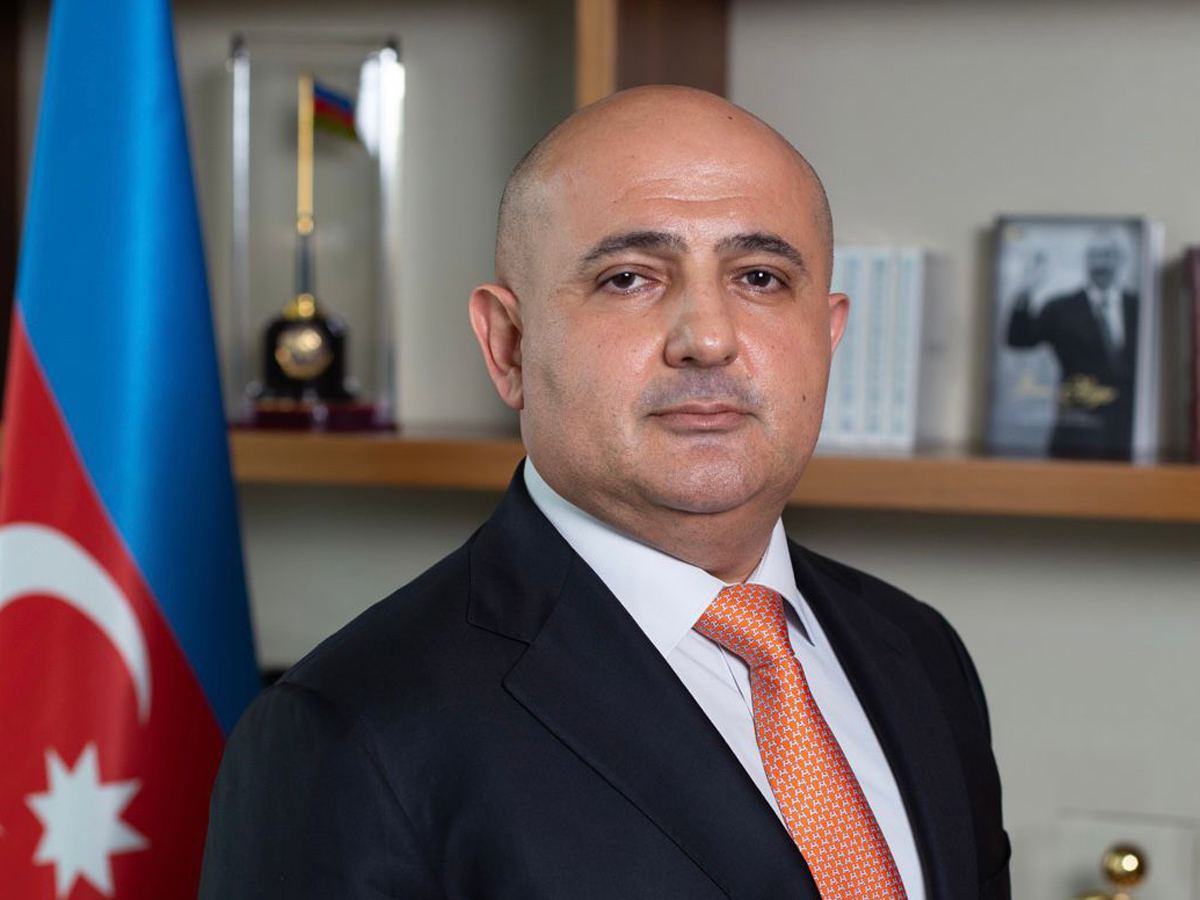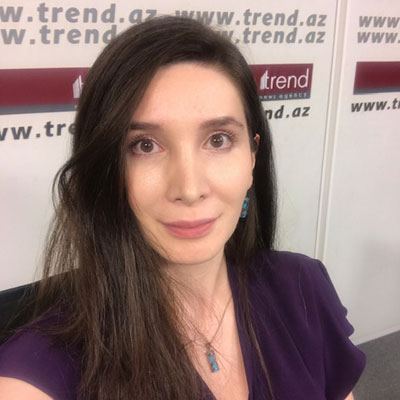BAKU, Azerbaijan, January 5. The revenues of the State Oil Fund of Azerbaijan (SOFAZ) on the Shah Deniz project reached the highest level in history in 2022-2023, said the CEO of SOFAZ Israfil Mammadov during an exclusive interview with Trend.
"As it is known, the majority of SOFAZ's oil and gas earnings come from the sale of the state's part of valuable hydrocarbons within the scope of the Azeri-Chirag-Gunashli (ACG) and Shah Deniz gas fields. The key factors impacting the dynamics of revenue formation are, of course, field production performance and global energy prices," Mammadov said.
According to Mammadov, despite the natural tendency of production decline observed at ACG in recent years, high world market oil prices of $101 per barrel in 2022 and $83 per barrel in 2023 have created the basis for achieving a higher level of revenues under the project compared to budget forecasts.
"Because of the predicted $7 billion in income from the ACG project, which accounts for around 76 percent of total oil and gas sales, 2023 is expected to be the second most profitable year in the post-pandemic period. ACG revenues have been significantly impacted by $450 million in annual bonus payments received by the Fund under the Production Sharing Agreement, which was renewed in 2018. Meanwhile, the successful completion of the Shah Deniz II project, as well as the delivery of Azerbaijani gas to Europe via the Southern Gas Corridor beginning in 2021, has resulted in a large increase in SOFAZ's gas income," he said.
Amid the developments over the past two years, gas prices in Europe have reached record highs. Additionally, the state share has increased in light of the rising dynamics of gas production. As a result, the Fund's revenues from Shah Deniz amounted to $1.4 billion and $1.3 billion in 2022 and 2023, respectively, which is the highest in the history of the project," SOFAZ executive director added.
As for the sources of the Fund's resources, Mammadov emphasized that according to the SOFAZ Charter (paragraph 3), the Fund's revenues are formed at the expense of oil and gas revenues, which are attributable to the share of the Azerbaijani state by production sharing agreements, revenues received from the Fund's investment activities, and other revenues and receipts by the legislation.
"For the first nine months of 2023, the total revenues of the fund's budget amounted to $8.8 billion. In the structure of budget revenues, income from the sale of profitable oil and gas amounted to $6.7 billion, bonus payments amounted to $471 million, and income from the management of the Fund's assets amounted to $1.6 billion.
According to projections for 2024, it is expected that $5.3 billion, or 75 percent, of the Fund's budget revenues will come from the implementation of oil and gas agreements, including $4.8 billion from the sale of profitable oil and gas, $451.3 million from bonuses, $14.2 million from transit revenues, $2.1 million from license area fees, and $1.8 billion from revenues related to the management of the Fund's resources," he said.
Speaking about the priority directions for spending the Fund's resources, the Executive Director emphasized that the use of SOFAZ resources is carried out by the main directions (program) approved within the Fund's budget for each year in line with the orders of the President of Azerbaijan, Ilham Aliev. The main directions for expenditures of the Fund's resources for the current and future years are the expenses related to the upper limit of transfer to the state budget, Mammadov added.
"The Fund's expenses for transfer to the state budget for 2023 and 2024 are approved at the rate of 11.7 billion manat ($6.8 billion) and 12.8 billion manat ($7.5 billion), respectively. At the same time, two educational programs are financed by the Fund, and it is further planned to continue financing these programs.
The fund was allocated 38.5 million manat ($22.6 million) in 2023 to finance the "State program on increasing the international competitiveness of the higher education system in the Republic of Azerbaijan for 2019–2023." And 33.5 million manat ($19.7 million) will be allocated in 2024. This program finances the implementation of double diploma programs signed between prestigious foreign higher education institutions and local higher education institutions, as well as the doctoral studies of Azerbaijani citizens abroad.
At the same time, 36.7 million manat ($21.58 million) has been allocated to finance the "State Program for the Education of Youth at Prestigious Universities of Foreign Countries for 2022-2026" in 2023, and 47.5 million manat ($27.9 million) is planned to be allocated in 2024. Within the framework of this program, the costs of education for 400 people will be financed, including 320 people for master's studies and 80 people for bachelor's studies in foreign universities," Mammadov said.
As for the Fund's plans to acquire a stake in any company or project outside the country shortly, the executive director noted that the Fund, in addition to transfers to the state budget within the framework of budget expenditures, also finances various strategically important socio-economic projects.
"The mentioned projects are determined under the main directions and investment policy of using the Fund's resources within the framework of the budget decree of the President of the Republic of Azerbaijan. According to the document approved for 2024, no new projects are planned to be financed. SOFAZ invests within the framework of the investment policy in financial assets such as debt and money markets, equities, real estate, and private equity by using the benchmarks provided for each financial asset, taking into account current market conditions," Mammadov said.
SOFAZ does not intend to finance any similar projects outside the country beyond this framework. At the same time, the Fund will continue to invest in the above-mentioned financial assets under the Investment Policy and Regulations," he added.
Furthermore, Mammadov noted that the composition of the currency basket of the fund's investment portfolio is determined based on the investment policy.
"In this context, I would like to state that 65 percent of SOFAZ's investment portfolio can be invested in financial assets denominated in US dollars, 20 percent in euros, and 5 percent in British pounds. The remaining 10 percent of the aforementioned portfolio may be invested in financial assets denominated in other currencies. According to the investment policy approved at the end of 2023, there is no change in the currency allocation of the investment portfolio for 2024," he said.
The fund's income is expected to be about $12.7 billion, or 21.5 billion manat by the end of 2023, he said.
"About $9 billion (71 percent) of these revenues are expected to come from revenues related to oil and gas agreements and $3.7 billion (29 percent) from investment activities. According to the decree of the President of Azerbaijan on the SOFAZ budget for 2024, the budget revenues for 2024 amounted to $7.1 billion, or 12.1 billion manat. Regarding investment return expectations, the fund is known to realize a strategic allocation based on a conservative risk appetite, having assumed the main objectives derived from its mission and portfolio management goals. SOFAZ formulates basic assumptions for strategic allocation of funds based on forecasts and advice from leading and influential organizations, and on this basis, the return and risk performance of financial assets are determined by the current parameters of market conditions," the CEO said.
He emphasized that the optimal asset type weights and target returns (benchmarks) are determined through internal models, and the results are reflected in the investment policy.
"The return levels of the said optimal portfolio are calculated based on internal models and return forecasts of various investment banks, taking into account how the underlying characteristics of financial assets will change over the long term. I note that the projected returns on financial assets usually cover the medium to long term and are taken on an annual basis as an average annualized return. The public will be informed of the profitability figures at the end of 2023, when the annual results will be announced," he said.
Referring to the tensions seen in the Middle East and their impact on the oil market, the SOFAZ CEO noted that the oil price is formed based on the principles of supply and demand, which are the foundation of a market economy.
"In addition to such fundamental factors, the impact of geopolitical events can create an economic shock in the market, which can result in significant changes in the oil price. In this context, conflicts and other processes occurring at the geopolitical level and the oil production decisions at the global level agreed upon under their influence play an important role in oil price forecasting. Note that the benchmark oil price used to generate Fund revenues for 2024 is $60 per barrel, and an increase in this price will affect the budget against a background of unchanged expenditures. As a result, oil revenues will exceed forecasts, and this will have a positive impact on the SOFAZ budget balance," the CEO said.
Mammadov added that the Fund also carries out partnership activities covering various spheres with several international organizations.
"Therefore, experts from institutions such as the International Monetary Fund and the World Bank regularly visit the SOFAZ office. They exchange opinions on the dynamics of growth of the Fund's foreign exchange reserves, the place and position of the Fund in the development of the country's financial system and macroeconomic regulation policy, as well as the possibilities of applying modern financial mechanisms and SOFAZ's investment policy," Mammadov said.
"It should be noted that the direct cooperation between SOFAZ and the World Bank has lasted for more than 15 years, and within this framework, seminars and trainings on various topics were organized not only on the above-mentioned issues but also in the direction of developing the knowledge and skills of the Fund's staff. The mentioned trainings mainly covered important topics such as portfolio management and investment policy, fixed income securities management, as well as equity investment and risk management," he added.
The CEO emphasized that the Fund's international partnership is not limited to the above institutions.
"In the financial markets, SOFAZ has close cooperation with more than 50 counterparties, 6 custodian banks, 7 foreign managers, as well as the world's most advanced and influential fund managers in real estate, private equity, infrastructure, and others in the field of alternative investments. It is planned to further develop this partnership in these areas," he emphasized.
Stay up to date with more news on Trend News Agency's WhatsApp channel







